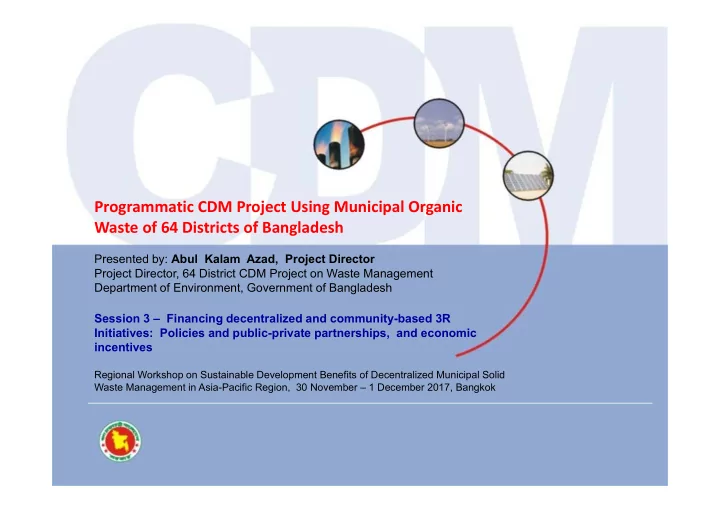

Programmatic CDM Project Using Municipal Organic Waste of 64 Districts of Bangladesh Presented by: Abul Kalam Azad, Project Director Project Director, 64 District CDM Project on Waste Management Department of Environment, Government of Bangladesh Session 3 – Financing decentralized and community-based 3R Initiatives: Policies and public-private partnerships, and economic incentives Regional Workshop on Sustainable Development Benefits of Decentralized Municipal Solid Waste Management in Asia-Pacific Region, 30 November – 1 December 2017, Bangkok
Presentation Outline • Brief on waste management situation in Bangladesh • Project description • Public private partnership approach • Financial analysis of IRRC operation • Strength and weakness
Present Solid Waste Management Situation of Bangladesh 47,000 Tons/day 23,688 Tons/day 13330 Tons/day 6493 Tons/day 2025 2014 1991 2005
Waste Characteristic of Urban Areas of Bangladesh 2.72% 0.44% 3.74% 7.35% 0.64% 4.84% 23,688 tons/ day Plastic 2.56% E-Waste Food Waste Fabrics 70% organic Papers Wood Metals ORGANIC WASTE Others 16,582 tons/ day 77.70% High organic matter >> (more than 70%) High moisture content >> (more than 50%) Low calorific value >> (less than 1000 Kcal/Kg)
Implementation of the National 3R Strategy for Waste Management, 2010 The National 3R (Reduce, Reuse, Recycle) Strategy for waste was passed in 2010. A National 3R Wing at the Ministry of Environment and Forests was established under this strategy to implement waste prevention activities, and an inter-ministerial committee to coordinate activities across ministries. National 3R Goal: The national 3R goal for waste management is to achieve complete elimination of waste disposal on open dumps, rivers, flood plains by 2015 and promote recycling of waste through mandatory segregation of waste at source as well as create a market for recycled products and provide incentives for recycling of waste Some of the recommendations of 3R strategy are as follows: 1. Encouraging public private partnerships to improve public services with regard to environmental management system, 2. Collaboration with scientific research bodies to promote recycling and recovery of waste. 3. To develop a mechanism to correspond between services received and payments made by citizens. 4. Supporting informal sector for recycling.
Preferred Waste Management Hierarchy
Composting Plants Implemented Under the Project Programmatic CDM using organic Wastes of Urban Centres (Phourashava/ Municipalities) throughout Bangladesh (in 64 Districts): Government used its Climate Change Trust Fund. Rangpur Municipality Capacity: 16 tons/day Mymensingh Municipality Capacity: 8 tons/day Narayanganj City Corporation Capacity: 22 tons/day Coxesbazar Municipality Capacity: 12 tons/day
Programmatic CDM Project Through Composting Recyclable Care Taker Storage Compost Box Room Biogas Workers Maturing Plant Toilet Box Screening Incoming & Waste Bagging Office and Storage Sorting Sun Drying Leachate Water Platform Collection Platform
Different Steps of Composting Process Source Separation Collection Sorting Mixing Weighing Piling Composting Maturing Screening Bagging Marketing Collection
Segregation of Waste at Source Group of Family & Individual Family Commercial 2 Bin System (Yellow & Green Bins) Transportation Truck Rickshaw Van (House to house collection)
Programmatic CDM Project Through Composting
Roles and Responsibilities of Partners Promoting pubic, private and community partnership Government providing incentives on land, construction cost for the compost plant, free utilities , no(electricity & water), awareness on source segregation of waste, free delivery of waste to the plant. Waste Concern providing technical support to establish and run the composting initiative.
Benefits from the Project The project is the first large scale attempt to improve waste handling by composting on a national scale. As a pioneering effort by the project proponent and the municipalities to be involved in the CPA, the project will contribute to the sustainable development of Bangladesh. The following environmental, economic and social benefits are achieved by executing the project: Economical benefits Social Environmental benefits benefits 1. Environmental benefits – assist in preventing uncontrolled GHG generation and emission from waste that would have been disposed at the landfill; production of soil improver (compost) to battle soil degradation; 2. Economical benefits – composting on this scale is a new industrial activity for Bangladesh and the projects will contribute to partial replacement of imported chemical fertilizer by locally produced compost; 3. Social benefits – jobs for locals and staff training to improve skills of locals. The project comprises the design and building of a composting plants at cities all over Bangladesh with a maximum daily input capacity of between 5 and 100+ tones per day. Apart from compost the projects will reduce methane emissions by diverting high organic waste from dumping at a landfill (where anaerobic process occurs) to a composting plant (aerobic process).
Operational Description of Compost Plants Name of Plant Description Total Narayangonj Mymensingh (22 Tons/d) (8Tons/d) Waste Collection 14 MT/ day 12 MT/day 26 MT/day Organic waste for 10 MT/day 8 MT/day 18 MT/day composting Compost (15-18%) 1.7 MT/day 1.36 MT/day 3.06 MT/day Male: 7 Male: 03 Male: 10 worker Female: 10 Female: 13 Female: 23 Employee Male: 03 Male: 02 Male: 05 Management Female: 00 Female: 00 Female: 00 Total: 20 Total: 18 Total: 38
Cost benefit analysis of Compost Plant (per day) Name of Plant Description Total Cost Narayangonj Mymensingh Waste Collection Free delivery Free delivery 00 US$ 68 US$ 64 US$ 132 Worker (US$ 4/P/day) Salary Management US$ 15 US$ 10 US$ 25 (US$ 5/P/day) Total: 83 Total: 74 Total: 157 Utility (Electricity, water US$ 40 US$ 58 US$ 98 supply, packaging etc.) Plant Rent US$ 4.16 US$ 2.08 US$ 6.24 Total Cost US$ 127.16 US$ 134.08 US$ 261.24 Total Income from Compost US$ 212.50 US$ 170.00 US$ 382.50 Sale( (US$ 125 per ton) Net income per day US$ 85.34 US$ 35.92 US$ 121.26
Strength of the Project • National 3R Strategy for Waste • Increasing demand of compost • Incentive from the city corporation • Cooperation from Municipality • Cooperation from Central Government
Weakness of the • Source separation • Less number of licensed operators • Absence of inorganic waste management
Thank You
Recommend
More recommend